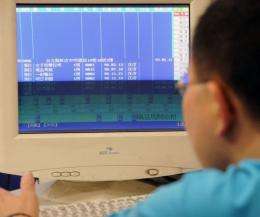Y2K-style computer bug looms over Taiwan

Thousands of small businesses in Taiwan are looking with growing unease towards December 31, 2010, fearing that the New Year will trigger a local version of the Y2K "millennium bug".
The island's unique calendar counts time from the 1911 revolution that brought down the last Chinese emperor, meaning January 1 will not be the start of 2011, but of year 100.
The concern is this could spell havoc for many older computers that have to get used to counting three digits rather than two.
"Numerous clients have approached me over the past six months and asked for advice on how to update computer hardware and software," said Lee Chin-hung, a technology consultant in the city of Hsintien in northern Taiwan.
Taiwan Resibon Abrasive Products Co, a plastics material maker employing more than 100 people, will replace some of the computers installed at its plant in Tamshui town outside Taipei.
"If not, data such as the serial numbers of the finished products would end up in a complete mess," said Yeh Kun-ming, a company spokesman.
Experts estimate that up to 200,000 local shops and companies still use computers that are not armed to withstand the local version of the millennium bug.
"Primarily, the bug may cause problems for accounting, inventory and personnel systems at small businesses," said Louis Chen, an economic ministry official.
Although there is little more than half a year left to get prepared, numerous companies have so far done nothing.
Fifteen percent of the island's small businesses say they have taken no pre-emptive measures even though they believe they may be at risk, according to a recent survey by the economics ministry.
"Most of them are micro businesses. In addition to budget considerations, many also know too little about coping with the threat," said Wang Wen-pu of Knowledge Free Way Corp, a Taipei-based private information service provider.
It is unavoidable that the situation Taiwan now finds itself in has led to comparisons with the big one -- the Y2K "millennium bug" of New Year 2000.
Edward Tenner, US author of "Tech Speak" and other bestsellers dealing with technology issues, said Y2K was a major concern a decade ago, even if few predicted a global meltdown.
"Most of the experts I met then expected localised interruptions rather than breakdowns -- brush fires, not an inferno," he told AFP.
Still, enterprises and government agencies worldwide spent hundreds of billions of US dollars to cope with the Y2K problems.
But when the clocks rolled over into 2000, only a limited number of Y2K glitches erupted and none of them led to the kind of major incidents that had been described in the worst scare scenarios.
While some experts said the absence of major disasters reflected the determined and hugely expensive preparations before the turn of the millennium, others argued the danger had been overstated.
That experience may affect the way people in Taiwan react, or choose not to react, ahead of the local "Y2K" event.
Lai Yueh-chun, the 46-year-old owner of a comic book rental shop, has already replaced the motherboard and the hard disk in his computer.
"I'm afraid all data on my clients could be gone by January 1 if I don't do anything," Lai said.
"But I'm still waiting to see if there's a cheaper option than buying a new computer."
(c) 2010 AFP


















